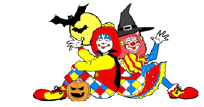In my last blog post where I interviewed a former Ringling clown, I believe we all learned some very valuable things. Information that we can easily use when we go out and "clown" ourselves. I've decided to catch up with a friend of mine, a clown relative in a way, someone that went through the same "Clown College" program that I did with Ringling Bros Circus. I hope we all can take away something that she has shared and use it to better ourselves...since that's what we clowns do! Without further adieux, here's my interview with Beth Grimes, clown extraordinaire!
Question 1: When did you decide or discover that being a clown was your destiny? How did you go about to accomplish this?
“I was a clown fan from a young age, after seeing Carson and Barnes as a kid with my dad. My mother's best friend was a professional clown and she would come over in makeup after gigs sometimes and I always thought that was neat. I got into silent and slapstick films and became a fan of those. Then, in middle school, I went through a purge. I wanted to be one of the 'cool kids' and literally took my circus and clown collection to the dumpster. Many years later my cousin thought I would enjoy the film "Benny and Joon" and boy was he right. My love of that stuff started to creep back. I searched social media to find someone else who had seen that film to talk about it, and found the profile of a clown, who I friended, and later he invited me to see Ringling Brothers in 2006 in Indianapolis. The minute my feet touched the pre-show floor ‘EVERYTHING’ that I loved about slapstick and clowning that I had thrown away came back to me in one huge ‘WHOOSH’. I watched the clown perform and wanted to be one of them. I began to research how to get started in clowning. The Ringling clowns gave me resources. I got my friends involved - they saw how interested I was in it and they wanted to try too! A street performance troupe was born and we grew to 11 members. The next year when Ringling came to Indianapolis, I didn't know any of the clowns on that unit so I wore a Buster Keaton t-shirt to let the clowns know I meant business! It worked! The rest is history!”
Question 2: During your journey as a clown, what are just a few things you've learned that you'll keep in heart forever?
“This answer has no particular order:
*The audience is ALWAYS watching. Even if it's an audience of 1 or 2 while you aren't the main focus.
*Kids have clown E.S.P. There are kids that seem to 'know' you are a clown even when you aren't in character or makeup. *Being a clown is not glamorous. It is sweaty, and dirty and emotionally exhausting. I have gone through elephant crap and tiger spray for laughs. Totally worth it.
*Everything has been done before. It's extremely hard to find anything new. Just make something "you". How would "you" do this? How would a modern person do this? Also, we are nearing a phase in which current audiences haven't seen routines which we consider old. Think; kids today have no idea what "shave and a haircut" is.”
Question 3: Where do you think the circus (in general) is headed in today's society?

“I see circus going back to small shows. Just as food trucks and craft beer are in vogue, I see "craft circus" being the thing. Circus won't die. Clowning won't either.
Why, in the 1880s, clowns were freaking out because their style had to change-prior to that clowns primarily told jokes and sang songs. With tents getting bigger, audiences couldn't hear the dialogue, so clowns decided to go back to performing with big movements and being silent, which hadn't been done since the panto-shows pre-civil war times!”
Question 4: Do you have a favorite memory from a clown gig? If so, what is it?
“My troupe and I were going to perform at a street festival downtown and as we were driving down there, a huge rainstorm hit. We figured there wouldn't be much of a festival with the rain but we were so close we parked the car and got our umbrellas. There were tons of people still down there but most of the vendors were closed up and none of the stages were entertaining. We pulled some picnic tables into the middle of the street and pretended to play air hockey with each other. Kids began to line up to compete against us. We played against the kids for almost 2 hours in the rain!”
Question 5: Tell us, what does being a "clown" mean to you?
“It's not about making people laugh. Being a "clown" means having the ability to connect with people. It's about magnifying the human condition to cartoony proportions. Take your audience on a journey with you. They will root for you if you are facing a problem, or feel bad for you if something doesn't go your way. Good clowns have made me cry as much as laugh.”
I want to thank Beth Grimes for taking time out of her busy clown schedule, driving super tiny cars and making pies to throw, for doing this interview. I personally have learned some great tid bits that I'll most definitely carry with me, and I hope you have learned something that you can do the same. Until next time, bump a nose!

